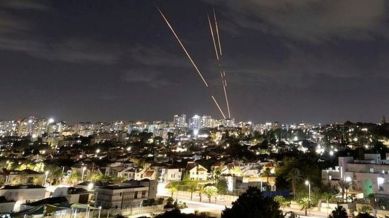Stay updated with the latest - Click here to follow us on Instagram
Iran-Israel attack highlights: Iran launches missile barrage against Israel, escalates Middle East tension
Iran's recent missile barrage on Israel was a retaliatory response to the alleged killing of key Iranian and Hezbollah commanders by Israel.

Iran has significantly escalated hostilities with Israel by launching around 200 missiles into Israeli territory. This is the second major attack from Iran this year, following a similar operation in April that involved hundreds of missiles and drones .
Israeli military officials have confirmed the attack, stating that while the immediate threat has passed, the full extent of the damage is still being assessed.
Why Iran attacked Israel
Iran’s recent missile barrage on Israel was a retaliatory response to the alleged killing of key Iranian and Hezbollah commanders by Israel.
The Islamic Revolutionary Guard Corps (IRGC) specifically mentioned the deaths of Hezbollah’s Hassan Nasrallah, IRGC commander Abbas Nilforoshan, and Hamas political leader Ismail Haniyeh in Tehran, for which Israel is widely believed to be responsible.
What happened so far
Iran’s Islamic Revolutionary Guard Corps (IRGC) launched a major operation targeting Israel, firing approximately 180 ballistic missiles, including its new Fatah hypersonic ballistic missiles, at “vital military and security targets,” specifically three military bases in the Tel Aviv area.
The attack was accompanied by a large-scale cyberattack. While the Israeli military intercepted many missiles, there were “isolated” impacts in central and southern Israel. The IRGC claimed 90% of its projectiles hit their targets, although exact details remain unclear. This significant escalation marks a dramatic surge in tensions between Iran and Israel, with potential regional implications.
Israel’s defence systems
Israel’s sophisticated air defence system, including the Iron Dome, played a crucial role in intercepting the incoming missiles. While Iron Dome is designed to intercept short-range rockets, other defence layers, including David’s Sling and the Arrow interceptors, were likely used to counter the long-range ballistic missiles fired by Iran.
How world leaders reacted to Iranian attack
World leaders have swiftly condemned Iran’s recent attack on Israel, urging restraint and de-escalation to prevent further violence.
- Israeli Prime Minister Benjamin Netanyahu said that Iran had “made a big mistake” and “will pay for it”.
- Iranian President Masoud Pezeshkian said in a post on X that the attack was a “decisive response” to Israel’s “aggressions”. “Let Netanyahu know that Iran does not seek war, but it stands firmly against any threat,” he wrote. “Do not enter into a conflict with Iran.”
- UN Secretary-General Antonio Guterres condemned “the broadening of the Middle East conflict with escalation after escalation”. In a post on X, he wrote: “This must stop. We absolutely need a ceasefire.”
What comes next
Israeli Prime Minister Benjamin Netanyahu issued a stern warning, stating that Iran “made a big mistake tonight” and would “pay for it.” Israeli Defense Forces (IDF) spokesperson Daniel Haggari echoed the sentiment, declaring that the attack would have “consequences” and that Israel remained on high alert.
US Defence Secretary Lloyd Austin also warned of “severe consequences” for Iran during discussions with Israel’s defence minister, Yoav Gallant. In response, the IRGC promised further retaliation if Israel decides to strike back, warning that Tehran’s future response would be “more crushing and ruinous.”